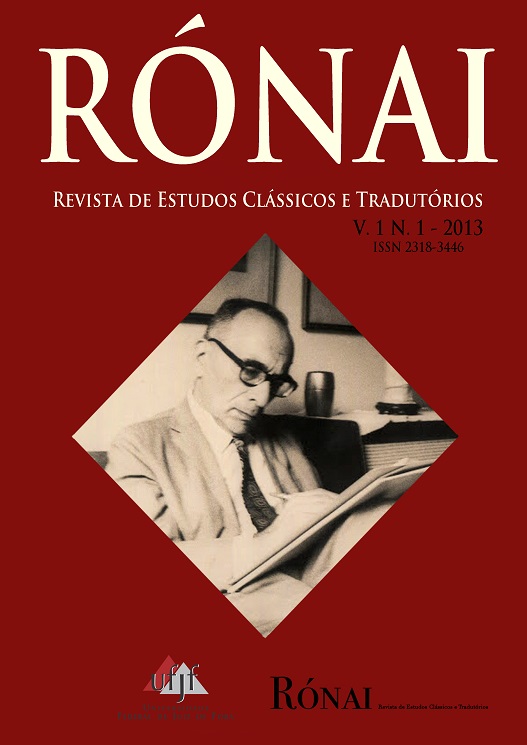Mito e história nas ‘Histórias': a narrativa de Heródoto
Myth and history in the Histories: Herodotus’s narrative
Palavras-chave:
Heródoto, Histórias, mito, realidadeResumo
A distinção gramatical entre os termos história e estória pode estar em desuso na língua portuguesa, mas permanece incólume no inglês, no qual history diz respeito à história de fato, e storyà ficção. Marc Bloch argumentava que a história é repleta de elementos ficcionais. Em Heródoto, o termo é, por vezes, confuso. Mito e realidade se apresentam em um único discurso, fazendo o real se mesclar ao irreal. A conclusão é que Heródoto deve ser lido dentro de seu próprio contexto – uma era pré-socrática – e fazendo as devidas distinções entre o real e o ficcional.
Abstract
The grammatical distinction between the terms história [history] and estória [story] can be in disuse in Portuguese Language, but keep scathe less in English, in which history regards ‘history’ itself, and story regards fiction. Marc Bloch argued that history was full of fictional elements. In Herodotus, the term is quite often confuse. Myth and reality presents themselves in a single discourse, making real merge with unreal. The conclusion is that Herodotus must be read within his own context – a pre-Socratic era – and making the distinctions between the real and the fictional.
Keywords: Herodotus; Histories; myth; reality
Downloads
Referências
BLOCH, Marc. Apologia da história. Rio de Janeiro: Jorge Zahar Editor, 2002.
CONDILO, Camila. Heródoto, as tiranias e o pensamento político nas Histórias. São Paulo: dissertação de mestrado na Universidade de São Paulo, 2008.
EVANS, JAS. Herodotus, explorer of the past. New Jersey: Princeton University Press, 1991.
__________. Notes on the debate of the Persian grandees in Herodotus 3, 80-82. Quaderni Urbinati di Cultura Classica, New Series, vol. 7, p. 79-84, 1981.
GEHRKE, Hans-Joachim. Myth, history, politics – ancient and modern, in: Greek and Roman Historiography, Oxford: Oxford University Press, 2011.
GRETHLEIN, Jonas. The rise of Greek historiography and the invention of prose, in The Oxford History of Historiography Writing, Oxford: Oxford University Press, 2011, vol 1, p. 148-170.
HARTOG, François. O espelho de Heródoto. Belo Horizonte: Editora UFMG, 1999.
HERODOTE. Histoires (vol. 1). Paris: Les Belles Lettres, 1956.
__________. Histoires (vol 3). Paris: Les Belles Lettres, 1949.
HERÓDOTO. História. Brasília: UnB, 1985.
HOMERE. Iliade: tome I (chants I-IV). Paris: Les Belles Lettres, 1949.
HUTTON, Maurice. The mind of Herodotus, in: Transactions and proceeding of the American Philological Association, vol. 42, p. 33-43. The John Hopkins University Press, 1991.
IMMERWAHR, HR. Form and thought in Herodotus. Atlanta: Scholars Press, 1986.
LECOQ, Pierre. Les inscriptions de Daius I, in: Les inscriptions de la perse achéménide, Paris: Gallimard, 1997.
MORRIS, JS. Pericles monarchos. The Journal of Helenic Studies, vol. 70, p. 76-77, 1950.
ROMM, James. Herodotus. New Haven: Yale University Press, 1998.
THOMPSON, Norma. Herodotus and the origins of the political comunity. New Haver: Yale University Press, 1996.
WATERS, HK. Herodotus the historian: his problems, methods and originality. Norman: University of Oklahoma Press, 1985.
Downloads
Publicado
Como Citar
Edição
Seção
Licença
Direitos Autorais
Autores que publicam nesta revista concordam com os seguintes termos:
1. Autores e autoras mantém os direitos autorais e concedem à revista o direito de primeira publicação, sendo a publicação licenciada sob a Creative Commons Attribution License 4.0 Internacional.
2. Os autores e autoras têm permissão e são estimulados(as) a publicar e compartilhar o trabalho com reconhecimento da publicação inicial nesta revista.
3. Os autores e autoras dos trabalhos aprovados autorizam a revista a ceder o conteúdo de seus trabalhos, após sua publicação, para reprodução em indexadores de conteúdo, bibliotecas virtuais e similares.
Para mais informações sobre a Creative Commons Attribution 4.0 International License, acessar: https://creativecommons.org/licenses/by/4.0/
Isenção editorial
O conteúdo dos artigos publicados é de inteira e exclusiva responsabilidade de seus autores, não representando a posição oficial da Rónai - Revista de Estudos Clássicos e Literários ou do Faculdade de Letras da Universidade Federal de Juiz de Fora ou das instituições parceiras.



